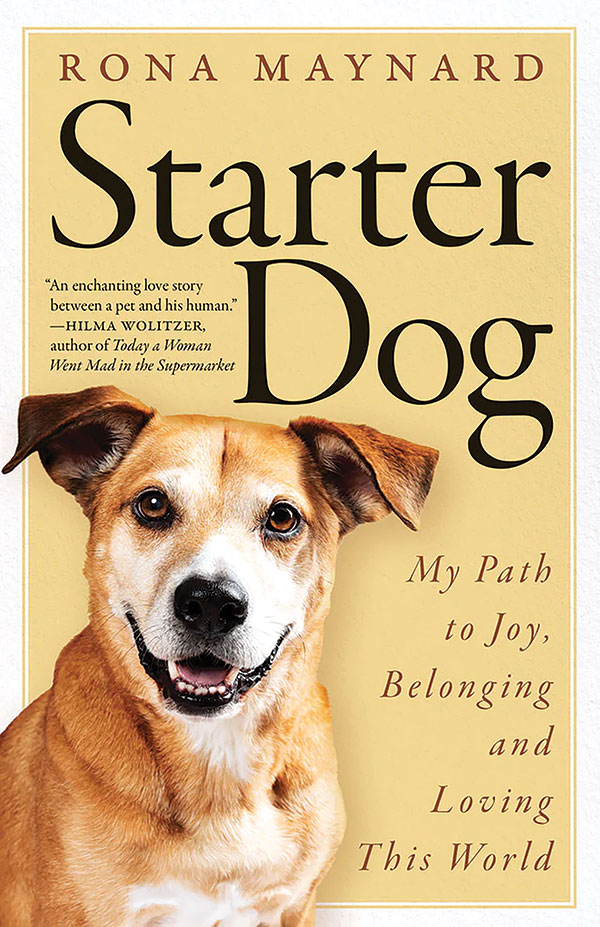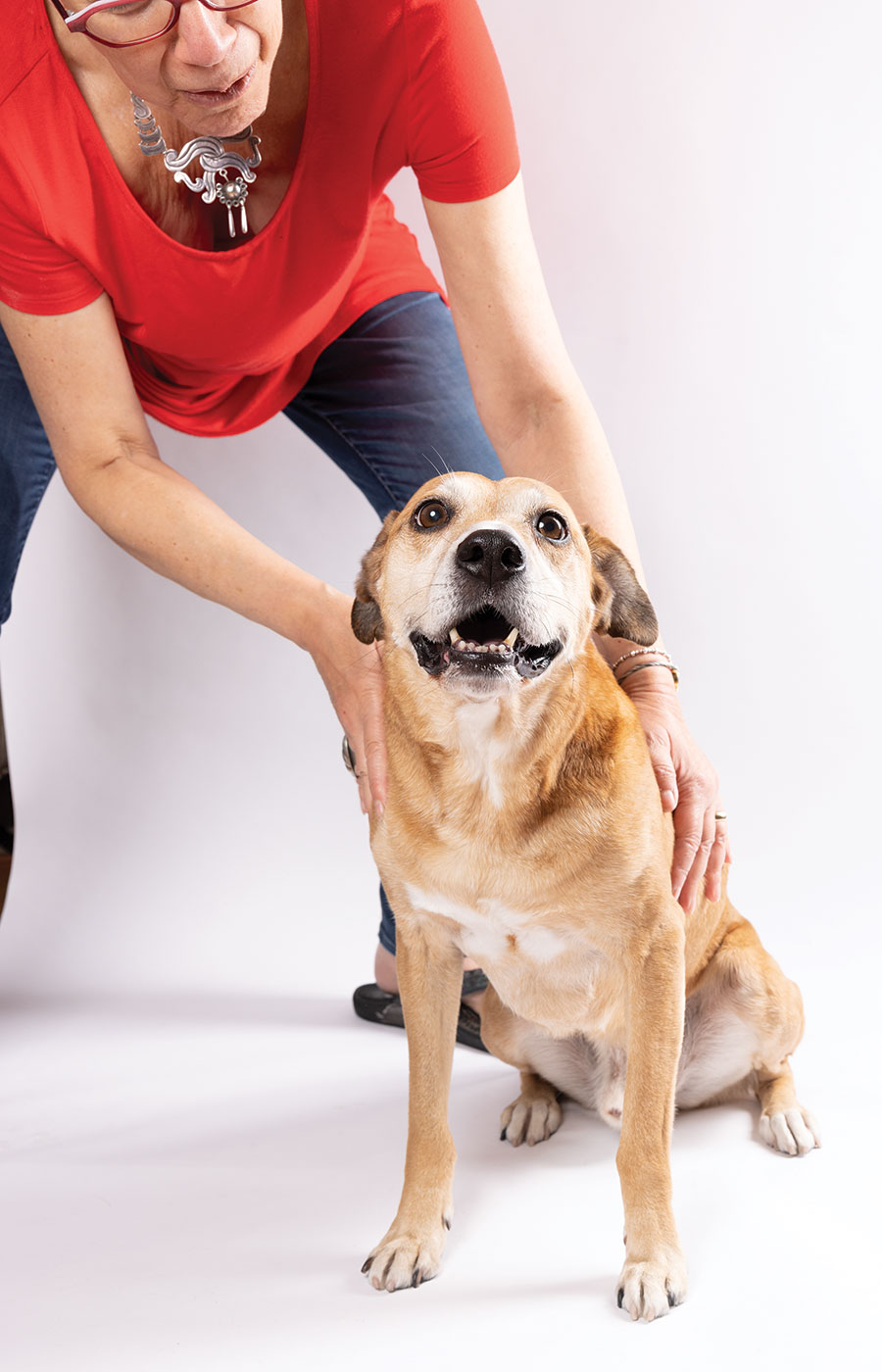Pet Cause: Animal Companions Are Good for Seniors’ Health, So Why Is It So Hard to Rescue and Keep One?

The author's dog, Casey. Photo: Heather Pollock
As the world mourned the Queen last year, I kept thinking of the dogs she’d left behind. My Facebook feed brimmed with cartoons of despondent corgis; one pup, depicted with a tear rolling down its face, went viral. The future of the pack seemed personal to me. I intend to grow old with paw prints on my sheets and a soft muzzle resting on my knee. But the Queen had Prince Andrew to take in her dogs and provide every canine comfort. My son is not keen on dogs.
My husband Paul and I were 65, our notion of late middle age, when we rescued our first dog. Then a goofy adolescent of 14 months, Casey shook us out of a rut. We laughed more and worried less. Paul got out of his chair to go exploring with Casey, and his blood pressure numbers took a sharp turn for the better. At 73, we’ve slowed down a bit, but Casey still gets a daily hour of exercise with each of his humans. Now a lively oldster in his 10th year, he has brought us more joy than any of our childhood pets and inspired my new memoir, Starter Dog: My Path to Joy, Belonging and Loving This World.

If a drug could do for seniors what beloved pets do, it would be a sure winner. Pets keep older adults healthier and happier, according to study after study. They improve morale, reduce depression and keep stress in check. Seniors with animals take less medication and make fewer visits to the doctor, because they have a friend beside them to ward off loneliness and ease the pain of bereavement. The Queen was well into her 90s, grieving the loss of Prince Philip, when her last dogs joined the royal household.
If we’re serious about keeping seniors well, we’d acknowledge the role of their animals. Yet they don’t even rate a mention on a Canadian government website about age-friendly communities, while affordable housing figures prominently (with well-lit sidewalks, health care and recreation close by). What’s more, many landlords and retirement homes will not accept animals. For people facing a move or no longer able to manage on their own, the only option is to give up a cherished family member – perhaps the only one within reach. How age-friendly is that?
“Older age is the most important time of life for people to have companion animals,” says Ardra Cole, a professor of education at Mount Saint Vincent University in Halifax and the founder of ElderDog Canada, a national charity devoted to keeping seniors and their dogs together. At 69, Cole has loved dogs all her life and paid a researcher’s attention to the comfort they give other seniors. Her 2019 study, “Grow Old Along with Me,” followed 14 seniors, aged 60 to 99, for a year, capturing both the power and the poignancy of loving a pet in later life. With no children needing attention or teammates waiting at work, seniors find a sense of purpose in caring for a creature that asks for nothing but food, exercise and affection. A woman in the study coined a name for this bond: “joyful responsibility.” It’s the umbrella held over a pup who hates the rain, the blanket and toy positioned just so at night. At Cole’s house, it was the motorized platform her husband built to get an old dog up the stairs.
Many barriers keep seniors and animals apart. If you don’t drive or live near public transit, try finding a cab that will take your best friend to the vet, where services add up fast. Last year, our dog’s care set us back more than $2,000 in office visits, vaccinations, tests and medications. (We were lucky: It can cost thousands more just to diagnose a complex problem.) And those daily bowls of food wreak further budgetary havoc, especially for those on fixed incomes. Canadian data compiled last year by Statista, an online market research company, set a year’s worth of cat food at $576 and dog food at $1,200. “People will feed their pet before they feed themselves,” says Mella Brown, co-founder of Through Ruff Times, a Toronto charity serving pet parents in need.
Some animal lovers give up hope of ever sharing their lives with a pet. Walking my downtown neighbourhood, I sometimes chat with a dignified septuagenarian who melts at the sight of my dog and wishes he could love one of his own. But with a disabled partner, and his only relative more than 3,000 kilometres away, he has no backup if he falls ill or dies.

No one wants to see a pet left behind. For the sake of animal welfare, some rescue organizations exclude seniors. A friend of mine, at 67, was approved for the adoption of a cat, then ghosted while the cat remained on the rescue site. She had made no secret of her age and can think of no other reason why she lost out on the cat. Chastened, she took no chances on a subsequent application for two cats listed on a different site. After knocking two years off her age, she received an appointment to collect the new family members. But when my friend and her white-haired husband arrived at the appointed hour, they received a frosty reception. The woman who handed them over looked the couple up and down with dismay, then muttered, “I know about people your age.”
By any reasonable standard, this retired couple’s home is cat heaven. The two have plenty of time for snuggling with their pets. With years of responsible adulthood behind them, they understand commitment. They have provided for the cats in their will and lined up a friend to adopt them should the need arise. Yet, in the eyes of the woman who grudgingly released the cats, they should have been disqualified. At the mention of their friend, she demanded, “Is your friend the same age as you?”
Age has little bearing on contingency plans for animals. My friend Sarah, young enough to be my daughter, promised her father she would take his dog, Jynxi, if his circumstances changed. Roger was 74, and newly in love with the rescue mutt his daughters found after the death of their mother. Man and dog blossomed together: He taught her to fetch, she got him socializing with his neighbours. After years of depression and anxiety, he would phone his daughters with glowing reports on his latest adventures with Jynxi. “She saved his soul,” recalls Sarah.
Roger and Jynxi were a team for three years. As far as his daughters could tell, they were still getting started, but then his physical and cognitive health declined quickly. Some retirement homes will accept small pets, but Roger’s only option, a memory care unit, would not welcome Jynxi, except on short visits that proved more stressful than cheering. Stricken with guilt for “abandoning” his dog, Roger kept apologizing to her and eventually stopped responding. Meanwhile, the sisters agonized over her future.
Sarah had taken Jynxi in, fulfilling a promise to her father, but she missed socializing on impulse with her friends. A dog in residence, even one as lovable as Jynxi, was proving too big an obligation, and her sister Julie’s apartment was too small to accommodate a dog as well as a home-based accessory business. A neighbour offered Jynxi a home, but, in the end, Julie stepped up and moved to a bigger apartment. Once again, the dog has a constant companion who adores her.
When I still called myself middle-aged, Casey once knocked me flat on my face while leaping to defend us from a giant Halloween ghost. Paul and I hope he’ll stay with us till we’re 76 or so – too old to be taking any chances with rambunctious canine bruisers. Our next dog will be a gentle senior, small enough for back-friendly lifting. I’m educating myself on the charities that help seniors keep their pets or find them new forever homes. I take heart from a woman in Cole’s study, who said, at 99, “I am a bit unsteady but, when I walk with Prayer, I’m not nearly so unsteady. We’re slow but we’re out and walking.”
Friends In Need
All seniors deserve access to programs like these, but for now it depends where you live. Your local humane society may know of other services in your area.
ElderDog Canada
“Pawds” in seven provinces offer an array of free services both everyday (walking, brushing, pet food delivery, transportation to the vet or groomer) and urgent (respite care for a hospital stay); and ElderDog will rehome senior dogs. To be assured of a loving home for any dog you can no longer care for, register with their long-term care program.
My Grandfather’s Cat
Serving seniors facing terminal illness or a move to assisted living, this national charity arranges homes for both cats and dogs. The goal: keeping the pet with its human until the very last day. Free.
Pet Assist Calgary
Regular volunteers provide friendship to local seniors and “practical kindness,” such as walks or litter changes, to their pets. On an as-needed basis, drivers pick up supplies and take pets to the vet, at no charge.
Through Ruff Times (Toronto only)
Volunteers foster pets for up to three months when owners of any age are struggling. During the stay, they send updates and photos. Also on offer: free food and litter.
The Farley Foundation (Ontario only)
Low-income people facing veterinary crises can apply for subsidies (up to $1,000) at clinics where at least one doctor belongs to the Ontario Veterinary Medical Association.
A version this article appeared in the April/May 2023 issue with the headline ‘Pet Cause’, p. 68.
RELATED:
As the Queen’s Corgis Find a New Home, a Lesson for Seniors Concerned Their Pets Will Outlive Them
How We Can Use Gaming to Support Positive Aging (and Support Our Relationships With Our Pets, Too)
Creature Comfort: New Documentary Series Explores the Crucial Role Pets Can Play in Healthy Aging